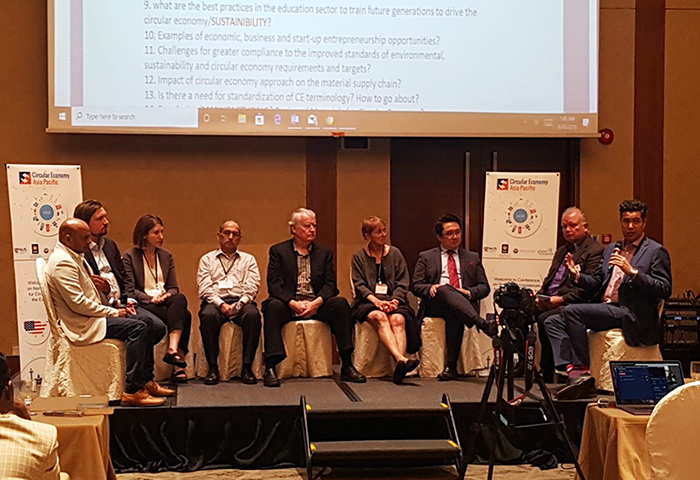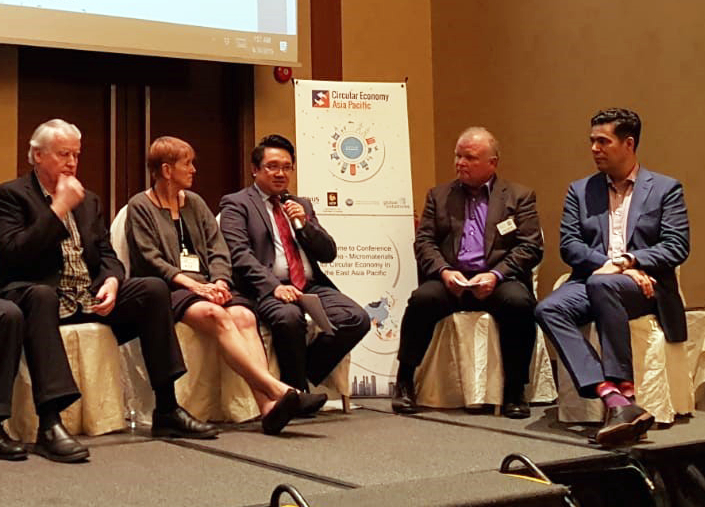Media Releases
Learning more about the circular economy
Media Releases

Experts gathered to speak on opportunities & gaps in the circular economy.
As the world faces increased resource depletion and waste, it is more critical than ever to embrace a circular economy — where products are made more efficiently, and resources and materials are reused for as long as possible.
Associate Professor of Business at James Cook University (JCU) in Singapore Adrian Kuah was invited as a speaker on the panel discussion “Circular Economy Opportunities and Gaps,” at the conference on Nano-Micromaterials for Circular Economy and Sustainability in the East Asia Pacific, jointly organised by the National University of Singapore (NUS) and the University of Central Florida (UCF). The panel discussion took place on 30 August, the second day of the conference’s four-day span.
Associate Professor Adrian Kuah is currently NMC Member for the ISO/TC 323 on the Circular Economy, where he was nominated by Enterprise Singapore — the government agency championing enterprise development.
The conference, funded by the National Science Foundation (US), aims to gather scientific professionals from different parts of the world, to discuss research findings on the field of circular economy and sustainability of nanotechnology, as well as promote collaboration between participants.
Chaired by Professor Seeram Ramakrishna — Professor of Mechanical Engineering; Chair of the Circular Economy Taskforce at NUS; and co-director of NUS Nanoscience and Nanotechnology Initiative (NUSNNI) — the panel discussion comprised of the following panellists:
- Dr Terry Collins – Teresa Heinz Professor of Green Chemistry & Director, Institute for Green Science at Carnegie Mellon University
- Dr Carol Handwerker – Reinhardt Schuhmann, Jr. Professor of Materials Engineering at Purdue University
- Dr David Grewell – Walter B. Booth Distinguished Professorship & Chair of Industrial and Manufacturing Engineering at North Dakota State University
- Dr Brajendra Mishra – Kenneth G. Merriam Distinguished Professor of Mechanical Engineering & Director of the Metal Processing Institute at Worcester Polytechnic Institute
- Dr Adrian Kuah – Associate Professor of Business & Senior Fellow of the Cairns Institute at James Cook University
- Dr Ashley A. White – Director of Communications, Lawrence Berkeley National Lab
- Mr Marc Allen – Technical Director of Engeco
- Mr Martin Stavenhagen – Co-founder and Director of SD Consulting
 (Members of the panel discussion, from left to right: Professor Seeram Ramakrishna; Mr Martin Stavenhagen; Dr Ashley White; Professor Brajendra Mishra; Professor Terry Collins; Professor Carol Handwerker; Associate Professor Adrian Kuah; Professor David Grewell; Mr Marc Allen)
(Members of the panel discussion, from left to right: Professor Seeram Ramakrishna; Mr Martin Stavenhagen; Dr Ashley White; Professor Brajendra Mishra; Professor Terry Collins; Professor Carol Handwerker; Associate Professor Adrian Kuah; Professor David Grewell; Mr Marc Allen)
The panellists shared their experiences in promoting and raising public awareness about the importance of the circular economy. Associate Professor Kuah emphasised that societal and consumer values have to take priority, citing his research findings that European consumers are more environmentally conscious than Asian consumers.
He elaborates, “Environmental problems caused by human activities must eventually be resolved by responsible societies and businesses.”
Meanwhile, Professor Collins pointed out that humans have used too much dangerous chemicals, and underscored the need for ethical standards with regards to what is acceptable and what is unacceptable.
Professor Grewell highlighted the importance of education, especially the need to raise children’s awareness of the environment from the age of 5 to 6 years. Dr White added that soft skills, such as collaboration and leadership skills, should be reflected in the school curriculum, to solve the complex problems that can be encountered in achieving goals of the circular economy.
Referring to a quote by Swedish climate activist Greta Thunberg, Professor Handwerker said that a simple and straightforward storytelling approach can be useful to attract the public’s interest in the circular economy.
As circular economy consultants, Mr Allen and Mr Stavenhagen also stressed the need for measurement tools to identify “circularity” produced as a result of circular economy activities.
 (Associate Professor Adrian Kuah speaking during the panel discussion)
(Associate Professor Adrian Kuah speaking during the panel discussion)
After the conference, Associate Professor Kuah said, “This conference has indeed shed light on how science has contributed to technological solutions in the recycling and recovery of precious resources, which also present numerous opportunities in closing the circular gaps.”
He continued, “Universities play a key role in taking actions to translate these research and to raise public awareness.”
In fact, James Cook University in Singapore, with the Singapore International Chamber of Commerce, is currently organising a competition that reinforces 2019 as Singapore's “Year Towards Zero Waste”.
The competition calls on students to develop a one-minute video message that raises awareness on sustainable habits, and develop a clear actionable plan, in one of the following categories:
- The correct use of recycling bins
- Food waste reduction
- Management of electronic waste
The best team in each category will be awarded $1000 cash prize for their ideas. Entries close on 1 October 2019.
Find out more about the SICC-JCU Circular Economy + Sustainability Competition.
Contacts
Associate Professor Adrian Kuah adrian.kuah@jcu.edu.au
Media: Pinky Sibal pinky.sibal@jcu.edu.au